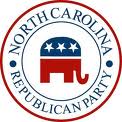Republican Party of North Carolina
|
North Carolina Republican Party
|
|
|---|---|
 |
|
| Chairman | Robin Hayes |
| House Leader | Mike Hager |
| Senate Leader | Phil Berger |
| Headquarters | 1506 Hillsborough St, Raleigh, NC 27605 |
| Student wing | North Carolina Federation of College Republicans |
| Youth wing | North Carolina Young Republicans |
| Ideology |
Conservatism Economic liberalism Fiscal conservatism Social conservatism |
| Political position | Right-wing |
| National affiliation | Republican Party |
| Colors | Red |
| Senate |
34 / 50
|
| House of Representatives |
74 / 120
|
| U.S. Senate |
2 / 2
|
| U.S. House of Representatives |
10 / 13
|
| Website | |
| www |
|
The North Carolina Republican Party is the affiliate of the Republican Party in North Carolina. Robin Hayes, a former congressman and state party chairman, was elected Chairman of the party on April 30, 2016.
Although Republicans first nominated a candidate for President of the United States, John C. Fremont, in 1856, the party was not established in North Carolina until 1867, after the Civil War. With the help of the newly enfranchised freedmen, Republicans were briefly successful in state politics, dominating the convention that wrote the North Carolina Constitution of 1868 and electing several governors. After Reconstruction, Democrats returned to power, often suppressing the black vote by violence and fraud. Republicans had success in the 1890s when they joined forces with the Populist party in an "electoral fusion." They gained enough seats in the legislature to control it in 1896, and elected Daniel L. Russell as governor in 1896.
To prevent this kind of challenge, after Democrats regained control of the state legislature, in 1900 they adopted a constitutional suffrage amendment which required prepayment of a poll tax and an educational qualification (to be assessed by a registrar, which meant that it could be subjectively applied), and lengthened the residence period required before registration. A grandfather clause exempted from the poll tax those entitled to vote on January 1, 1867, which limited exemptions to white men. These barriers to voter registration caused a dramatic drop in the number of African-American voters in the state by 1904, although they constituted one-third of the population. An estimated 75,000 black male citizens lost the vote.
With North Carolina a one-party Democratic state of the Solid South following the disfranchisement of blacks, North Carolina Republicans struggled to survive as a party during the first half of the twentieth century. African Americans were virtually excluded from the political system in the state until the late 1960s. In 1928 Republicans carried the state's electoral votes for president (for candidate Herbert Hoover). White members of the Republican Party generally lived in the Piedmont near Charlotte and Winston-Salem, and the mountains in the western part of the state. In 1952 Charles R. Jonas was elected to Congress from the western part of the state as the first Republican since before the Great Depression. He was joined in 1962 by Jim Broyhill. From this base, and nearly winning the electoral votes for the state in the Presidential elections from 1952 to 1960, the party began to grow.
...
Wikipedia
